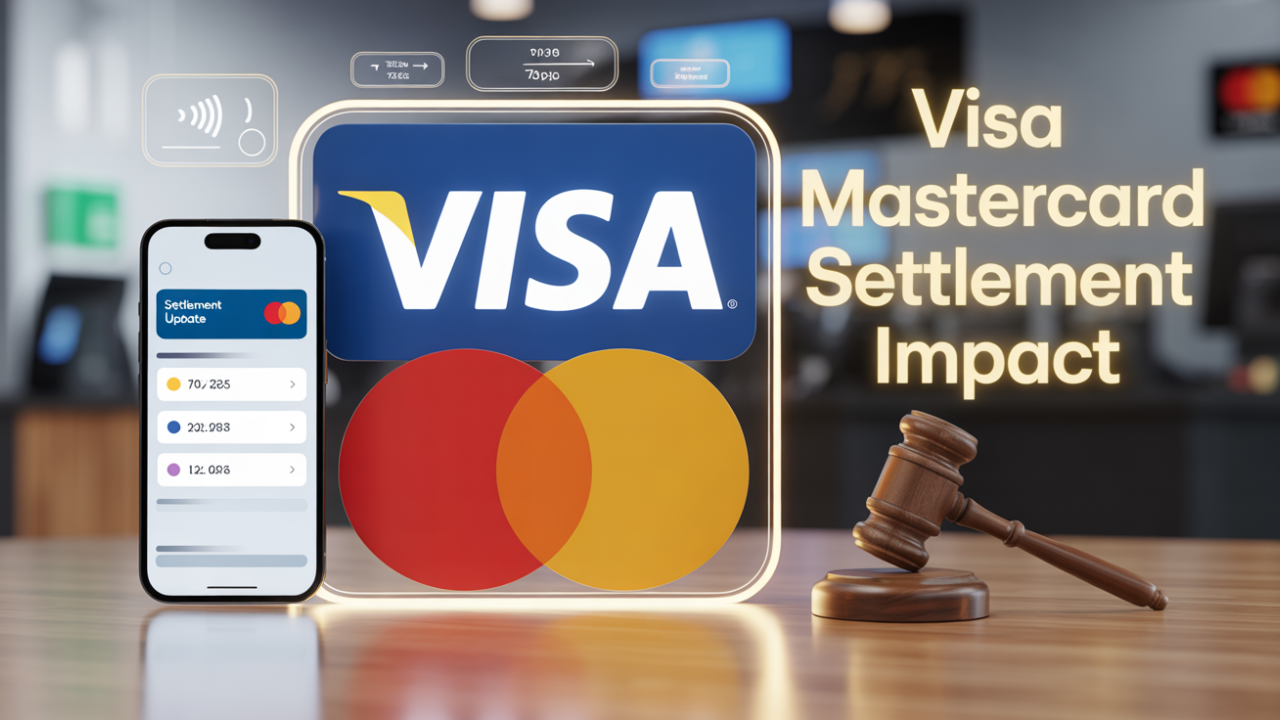It has recently announced that visa and master card, which are the two biggest card network companies in the world, recently came to an understanding on a settlement of an influential lawsuit that rattled the international financial system. This agreement now not only ends a very old disagreement between card companies and merchants, but most significantly, is going to affect millions of consumers making use of credit cards to carry out daily transactions. It has signaled that a shift is soon to be felt on the landscape of the financial world, and its immediate effect is already visible on credit card usage, fees, and rewards programs.
In all these millions consumers who live in the world, for example, in India, some rely on the Visa and MasterCard debit and credit cards. Shopping, purchasing online, bill payments, travel, hotel bookings—everything seems wrong without these cards. This is the circumstance that prevailed before the legal settlement brought forward new problems needing awareness by every single consumer.
We will provide detail about the settlement: what it is, the background of the dispute, what changed for the merchant and consumers, and how it may affect your credit card usage and rewards going forward.
What is the Visa-Mastercard Settlement and Why Did It Happen?
For ages, both Visa and Mastercard had charges against them for allegedly putting merchants through peculiar interchange fees (also called swipe fee) based on an added set of restrictions they place on the way merchants use any of their networks. According to merchants, the fees charged through accepting card payments were beyond limits and made portions of the earned profits to shrink. This was then built into a series of calls for lawsuit filings of more than thousands of merchants coming together and suing collectively.
Ultimately, it became lengthy litigation, and Visa and Mastercard finally decided to go forth with a settlement of several billion dollars. That settlement involves a number of conditions and changes to be expected for greater relief from the part of merchants. However, through indirect methods, consumers will also be affected by those changes since cost increases or decreases in any industry always reach users.
The Interchange Fee Dispute and Its Fallout
Simply put, interchange fees are the fees that card-issuing banks charge merchants to transact every card swipe. Visa and Mastercard is going to be the network that makes this process happen, hence they also incur fees. Merchants say those fees have reached 2 and 3 % depending on the country, and they prohibit doing business.
In fact, small businesses across the world face more unfavorable conditions related to those costs. If, for example, thousands of rupees worth of card payments are cleared by a small merchant per day, those fees can eat into their profits, leaving them almost down to making no profit. Merchant associations have been demanding lowering of these fees for a long time now.
Yes, the settlement might give certain relief for merchants, but the trade-off is that card companies and banks may have to earn their revenues from some other sources. This “other place” often turns out to be the customers’ pockets.
Freedom Given to the Merchant After Settlement and Its Effect on Consumers
Summarizing all these things, one major element of this settlement is that merchants now have greater latitude to accept individual cards or deny accepting them based on the fees. Prior to this, Visa and MasterCard had so many restrictions on merchants, including those:
- Merchants must accept all cards in the same manner
- Merchants must not prioritize different networks
- Merchants must not inform customers about card usage based on fees
Those restrictions have been relaxed post-Settlement.
The above may be a factor affecting consumers in that high-fee premium cards will no longer likely be accepted at every store. This could throw quite a few consumers in the lurch who are trying to collect extra rewards or cashback through premium credit cards.
If merchants find the fees charged by one card too high, they can reject it or ask the customer to use a different card.
Will This Affect Rewards on Credit Cards?
It certainly will, and this is the most important part. Most of the credit card reward systems—cashback, airmiles, points, or club benefits—tend to rely on income from interchange fees. Basically, when the charges to merchants come down, the banks and card companies will not get enough incremental revenue to give attractive incentives to consumers.
Many cutbacks in the reward offers on reward cards were seen around many countries when interchange fees were brought down before. For example:
- Some sign-up bonuses for certain cards were much lower.
- Cashback percentages went from good to poor.
- Airmile rewards slowed down.
- Annual fees increased for premium cards.
Just like the above changes in the rewards programs, the changes will show up sooner or later due to the Visa-Mastercard settlement in the future. However, this will not happen instantly as a lot of these changes could happen in the months to come when the card-issuing banks might be expected to update their rewards policies.
Could Credit Card Fees Increase?
While fees from the merchants have been reduced or capped, banks and card networks will have to revamp their revenue sources. One such way will be raising fees corresponding to consumers, which include the following:
- Raising credit card annual fees
- Changing late fees
- More fees for premium card service
- Introducing fees on international transactions
One expects these changes in several countries. It’s Been Noted: Banks Build A Profitable Business Model With These Repercussions; Consumers Are Compensated for Any Loss in Earnings.
Is This Change Good or Bad for the Consumer?
Well, it is a little tricky because it depends on credit card usage and other financial habits of consumers.
On one hand, merchants will have to pay lower fees, which could result in some work around prices for goods and services. Consumers could benefit if they passed this on to customers.
However, if banks and card companies reduce rewards or boost card fees, then consumers who seek rewards will suffer. Especially if they collect points or air miles for every expense, disappointment is great.
This means certain consumer segments will be affected differently by settlement benefits or losses.
What Changes Will You Bring Into Your Credit Card Usage?
It is worth considering your credit card usage in a changing financial environment. Perhaps you will want to compare other cards if your reward dwindles in the months that come.
If a card’s annual fee relative to what it offers grows, it is not necessarily good for you anymore. Neither is a meritorious card beneficial if merchants are unwilling to accept it.
This will have a Broad Impact on the Banks’ Financial Market of the Dreams.
The Larger Impact on the Financial Market
The Visa-Mastercard settlement primarily affects the credit card industry; however, it is not limited to that. It has a huge impact on the changes in consumer finance. It will increase competition in payment networks, bring new digital payment systems, and change the balance between merchants and consumers.
In future, it might also attract more people to alternate payment options such as UPI, digital wallets, and bank-to-bank transfers since they are cheaper than credit cards.
Conclusion
This legal settlement between Visa and Mastercard is historic because it will change the industry of credit cards for many years into the future. Consumers will experience a mixed bag of results while merchants will rejoice.
Many will benefit indirectly through lower fees, while customers using rewards cards may have to suffer.
Most importantly, reductions or possible increases in card fees, changes in the acceptance of premium cards, and all else will redefine the consumer experience.
The most financially savvy who adapted their card usage smartly over time stood to gain most from the new system. Therefore, this settlement should not be regarded as simply legal change but rather as economic change which is great for every credit card holder.
FAQs
1. What is the Visa-Mastercard settlement about?
The settlement resolves a long dispute over high interchange (swipe) fees charged to merchants. Visa and Mastercard agreed to reduce certain restrictions and fees. This change is expected to impact both merchants and credit card users.
2. Will my credit card rewards decrease after the settlement?
Yes, reward reductions are possible because rewards are funded by interchange fees. If merchant fees drop, banks may cut back on cashback, points, and airmiles. Changes may roll out gradually over the next few months.
3. Can merchants now refuse certain credit cards?
Yes, merchants now have more freedom to accept or deny high-fee cards. They may refuse premium cards that cost them more in fees. Consumers might need to carry alternative cards if acceptance varies.



